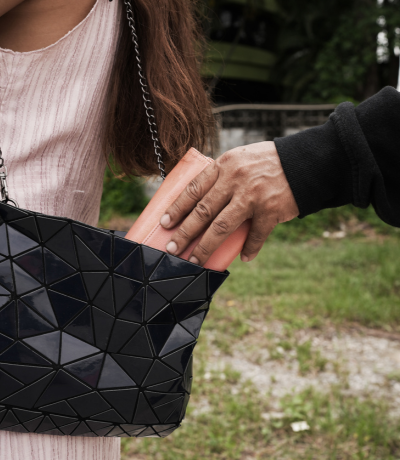Foolproof Ways to Avoid Pickpocketing
4 October 2024
Petty crimes like pickpocketing are a growing problem for travelers. Although there are no reliable statistics on crime against tourists, there’s plenty of anecdotal evidence that the problem is getting worse—and it’s changing as thieves and tourists learn more about each other’s habits.
A recent Reddit thread on this topic had succinct advice: “Common sense and situational awareness will protect you 99% of the time.” (credit to: ItsMandatoryFunDay)
I 100% agree with that advice and will tell you how to do it in this article. Let’s go!

Secure valuables behind zippers
Without going out and buying a lot of new clothing, you probably have this level of security already.
Most men’s jackets (and many kinds of pants) have zippered pockets. The safest ones are on the inside of your jacket, so you can also close the jacket for an extra layer of protection.
Women’s clothing styles tend to be less zipper-friendly, so you’ll likely have to rely on your purse or backpack. These can be just as secure as long as you:
1) remember to zip them closed,
2) wear it slightly in front of you (so you can see it), and
3) have a lock or clip to secure the zipper closed.
Hint: The Travelon anti-theft bags are the best! And no, I don’t receive anything from them for that recommendation.
Unfortunately, zippers aren’t 100% foolproof. We recently heard this story of a traveler on the Métro Line 3 in Paris, which was rocking at each turn and quite full of people. The traveler noticed another passenger bumping against him but thought nothing of it. When he got off the train, however, he noticed that the zipper in his travel pants was halfway down—the thief had just missed his wallet!
Pro tip: Put a large rubberband around your wallet. This will make it more ‘sticky’ and harder for someone to get it out of a pocket without you noticing.
While wallets and passports are commonly stolen items, what thieves really want these days are your smartphones! That leads us to the next topic.
Secure your phone with a cord
This is where you will have to make a small investment, but it will be worth it.
Most phone thieves know you’ve secured your phone with a passcode, so they’ll watch you enter the passcode by lurking over your shoulder when you pull it out to check your location.
Here’s how to keep your phone more secure (and not just when you travel):
- When you use it in public, hold it with both hands.
- Shield your hands (like under the table) when you type in your passcode.
- Better yet, use biometric sign-in instead.
- Secure your phone with a bungee or tether.
Both bungee cords and tethers can secure your phone, but they have different characteristics:
- A bungee has a hook on one end and a phone ‘wrap’ on the other. It also stretches, so it can get slightly farther away from you, but it bounces the phone back.
- A tether also has a hook on one end, and a phone ‘wrap’ on the other, but the distance it can get away from you is limited to the length of the cord.
Both devices can protect your phone from breaking when it’s dropped and can keep it attached, or ‘tethered’ to your body, belt, or clip inside or on your backpack or purse.
If a thief grabs your phone, the distance they can run is defined by the length (and strength) of the cord.
In this case, it’s a pick-your-poison decision. Do you want the phone to fly back at you, or do you want to limit how far it gets away from you? Depending on your personal strength and balance, do you feel comfortable with a thief potentially yanking you to one side until they let go?
Whichever option you choose, make sure you test it out. Can you easily use your phone on the cord? Where and how will you secure it? Before you leave, try it out on a walk or date night in your hometown to see how it functions for you.
And all the pickpocket common sense rules
Remember that every pickpocketing event begins with a victim being sized up, so not looking or acting like a tourist is important. Of course, that’s difficult when you’re engrossed in the views and what you’re experiencing.
So here’s a full list of the common sense rules:
- Don’t respond to people in the street offering you anything – these are tricks to get your hands away from your valuables. Say “No thanks” and move away from them.
- Never leave items on the table or hanging on your chair – these are too easily snatched. Purses and backpacks should be set in front, ideally with a strap hooked around your leg.
- Your back pockets are considered ‘sucker pockets.’ You can’t see what’s happening, and they are far too easily accessed by anyone walking by. Don’t use them.
- Don’t react – in fact, step away from – incidents or ‘accidents’ happening around you. These are designed to distract you; think falling lady, or boys scuffling, or a couple arguing.
- Don’t be drunk in public or wear flashy things – in fact, wear a plain wardrobe prioritizing dark colors.
- Don’t carry all your cash or cards in one place – separate it out and only carry what you need for that day. Secure the rest in your hotel or lodging.
- If you find you’re in a crowded place, consider coming back at a less busy time. Pickpockets make bank in crowds. If you can’t avoid the crowds, be extra vigilant and alert.
Finally, be situationally aware as much as possible while enjoying your trip. It’s not about being anxious; it’s about calmly keeping an eye on the situation and environment around you. This is your number one way to avoid becoming a victim.
Related topics
Damian Tysdal is the founder of CoverTrip, and is a licensed agent for travel insurance (MA 1883287). He believes travel insurance should be easier to understand, and started the first travel insurance blog in 2006.
